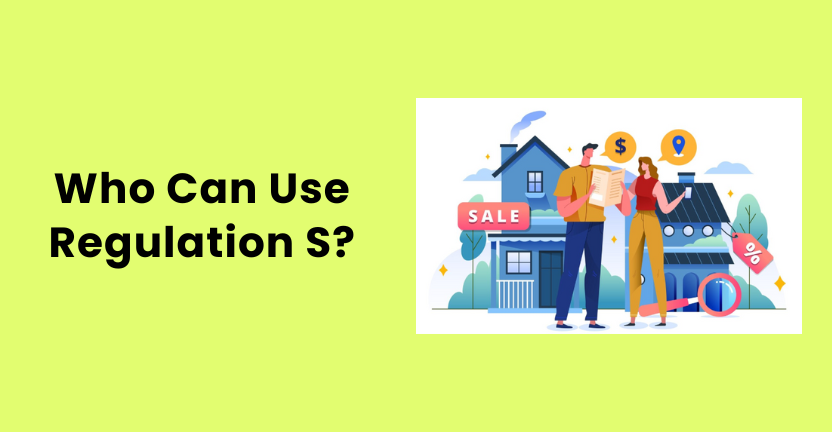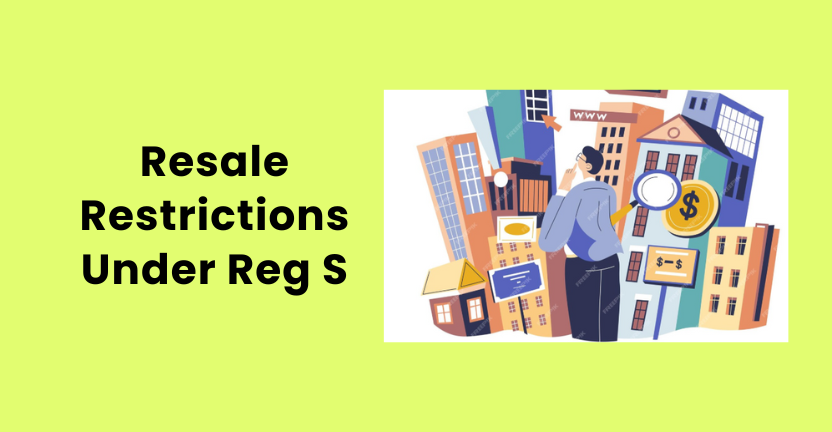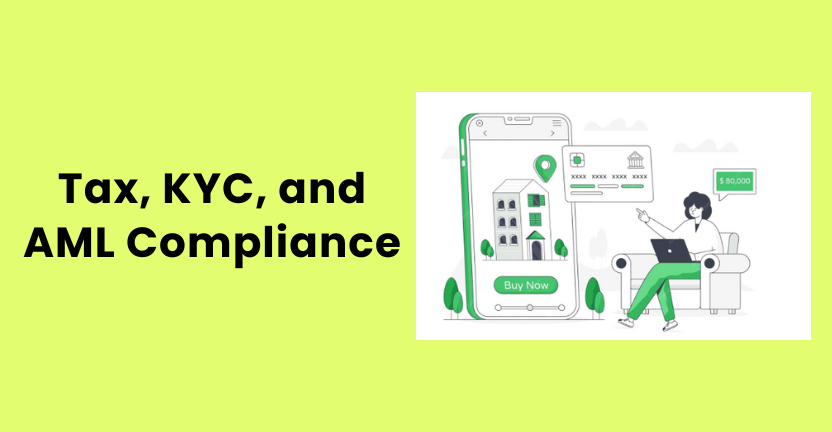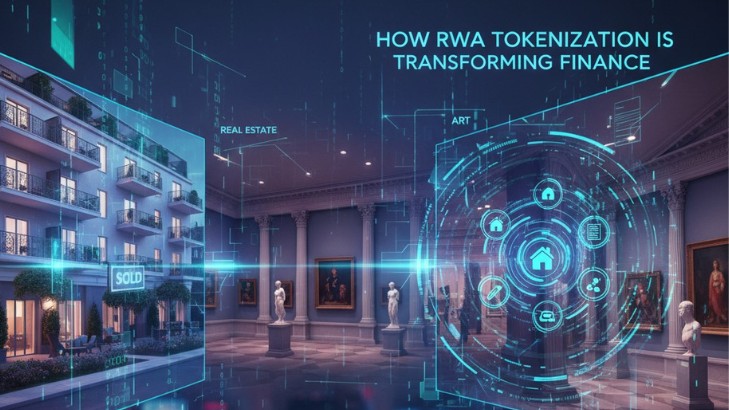Everything You Need to Know About Regulation S (Reg S)
June 26, 2025



Introduction
When most founders or marketers think about equity crowdfunding, their minds go straight to Regulation CF, Reg A+, or maybe Reg D 506(c). But there’s another player quietly driving millions in funding behind the scenes—Regulation S (Reg S). It’s often overlooked, yet incredibly powerful when used correctly. Especially for global-minded startups and the seasoned equity crowdfunding agencies that support them.
Reg S is the legal key to raising capital from investors outside the U.S.—without triggering all the SEC’s disclosure and registration requirements. That’s right. If you’re not offering shares to U.S. persons, and you structure things properly, you can tap global capital markets with fewer headaches and faster timelines.
Now here’s the real kicker: when Reg S is paired with a Reg D 506(c) campaign, magic happens. You can run a public campaign in the U.S. for accredited investors and simultaneously raise funds from non-U.S. backers—without either side stepping over the compliance line. The top 1% of equity crowdfunding experts use this dual-raise strategy regularly. And the best part? Most early-stage companies and even some agencies don’t know it’s possible.
Why Should Founders Care?
Because capital is competitive. When you restrict yourself to only U.S.-based investors, you’re leaving money on the table. The global investment community—especially in Europe, the Middle East, and parts of Asia—is hungry for private U.S. deal flow. Many family offices, crypto whales, and angel syndicates prefer investing in U.S. tech, but won’t go near SEC entanglements.
Reg S lets you speak directly to them.
Why Should Agencies Care?
Because it’s a high-value upsell. If you’re running campaigns for clients and you’re not offering Reg S support, someone else will. It positions your equity crowdfunding agency as strategic, not just tactical. You’re no longer just running ads—you’re architecting a global raise.
Insider Tips From the Trenches
- Use geofencing on your funnel. Route international traffic to your Reg S flow. Keep U.S. traffic fully separate and compliant with Reg D or Reg CF.
- Invest in real-time KYC and IP tracking. Regulators want to see proof that your offers stayed offshore. Don’t rely on static disclaimers—use dynamic compliance tools.
- Translate your landing pages. If you're targeting Germany or Japan, provide local-language content. It builds trust and satisfies Reg S disclosure best practices.
Educate your legal team. Many generalist lawyers don’t understand how Reg S fits into modern digital fundraising. Partner with experts who’ve done it.

What Is Regulation S?
Regulation S (often shortened to “Reg S”) is a safe harbor built into the U.S. Securities Act of 1933. It carves out a clean lane for companies that want to raise capital offshore—beyond the reach of direct SEC registration. In plain English, if every offer and sale happens outside U.S. borders and only to non-U.S. persons, you can skip the heavy SEC filing burden.
Why does this matter to an equity crowdfunding agency? Because many global startups dream of tapping non-U.S. investors while running parallel Reg D or Reg CF campaigns at home. Reg S lets you do that—legally and efficiently.
How Reg S Fits Into the Exemption Stack
Think of the exemption stack as a toolkit:
- Reg CF: retail equity crowdfunding inside the U.S.
- Reg D 506(c): accredited-only, public solicitation allowed.
- Reg A+: mini-IPO for both accredited and non-accredited U.S. investors.
- Reg S: the offshore twin—perfect for foreign backers, family offices, and crypto whales outside America.
A seasoned equity crowdfunding expert will often stitch Reg S to Reg D. The result is a single landing page that geofences traffic: U.S. visitors route to a compliant 506(c) flow, while overseas traffic sees the Reg S version.
Insider Tips From the Trenches
- Log Your IP Blocks. Regulators look for evidence that offers stayed offshore. Save server logs showing foreign IP traffic only.
- Flag “Directed Selling Efforts.” No U.S. ads, even retargeting banners. Whitelist geographies in your DSP.
- Use Dual-Language Docs. Investors in Germany love German summaries. The SEC loves to see clear, localized disclosure.
- Embed KYC/AML Early. Offshore doesn’t mean off-the-grid. Tie your investor portal to a Tier 1 KYC provider.
- Plan the Exit. Reg S shares often sit in Category 3. That’s a 12-month lock-up. Message it upfront to avoid angry Telegram groups later.
Key Takeaway
For founders and agencies eyeing equity crowdfunding on a global stage, Regulation S is the unsung hero. Use it to unlock non-U.S. capital, run simultaneous U.S. campaigns, and keep compliance headaches to a minimum—if you follow the insider playbook above.

Who Can Use Regulation S?
Regulation S isn’t for everyone. But if you understand who qualifies—and how to stay compliant—it opens up an entire world of international capital.
1. U.S. Companies Raising Offshore Capital
If you're a U.S.-based startup or business, Regulation S lets you raise funds from investors outside the United States without triggering SEC registration requirements. That’s massive. Especially if you're running a parallel equity crowdfunding campaign under Reg D or Reg CF for domestic investors.
But there’s one rule you must never break:
You cannot offer or sell to U.S. persons.
Not even accidentally. That means the deal, the pitch, the transaction—everything—must take place offshore and stay offshore.
2. Foreign Companies Avoiding U.S. Securities Laws
If you're a company based outside the U.S., Reg S lets you raise capital globally—as long as you avoid U.S. investors. You don’t have to register your securities with the SEC, and you don’t have to comply with U.S. disclosure rules.
That’s why international fintechs, real estate syndicates, and Web3 projects love Reg S. They get to pitch the world without stepping into the SEC’s jurisdiction.
Example: A Singapore-based crypto startup uses Reg S to sell tokenized equity to European and Asian investors. Meanwhile, U.S. residents are geoblocked and redirected to a “not available in your region” page. Smart. Legal. Effective.
3. The Two Golden Rules of Reg S
To stay compliant, you must meet these conditions:
- The offer and sale must occur outside the U.S.
- The buyer must be a “non-U.S. person.” (We’ll define this in the next section.)
This means your ads, emails, webinars, and deal pages must be offshore-facing only. No accidental Twitter posts hitting U.S. audiences. No U.S. newsletter mentions. Not even a LinkedIn DM that lands in New York.

Key Legal Definitions
When dealing with Regulation S, precision matters. The SEC uses specific terms that carry weight. Misunderstand them, and your entire offering could be non-compliant.
Below are the three most important legal definitions every founder and equity crowdfunding agency must know cold.
1. Non-U.S. Person (Rule 902(k))
A non-U.S. person is someone who is not a U.S. resident or entity. But it goes deeper than that.
The SEC excludes more than just U.S. citizens:
- U.S. residents, regardless of citizenship
- U.S.-based companies or partnerships
- Accounts held by U.S. fiduciaries (e.g., trustees, custodians)
- Foreign branches of U.S. entities
On the flip side, foreign investors living outside the U.S. with no U.S. ties generally qualify. That includes individuals, funds, and institutions.
2. Offshore Transaction (Rule 902(h))
To be valid under Reg S, the offer and sale must take place entirely outside the United States.
That means:
- No in-person meetings on U.S. soil
- No contracts signed within U.S. jurisdiction
- No website access from U.S. IPs
In short, the entire transaction must happen offshore—physically and digitally.
A strong equity crowdfunding agency will enforce this by using IP blockers, regional redirects, and jurisdictional disclaimers across all deal touchpoints.
3. Directed Selling Efforts (DSE)
This is the big one. Directed Selling Efforts refers to any activity that markets or promotes the securities offering to U.S. persons.
The SEC defines this broadly. It includes:
- Paid ads targeting U.S. audiences
- Press releases distributed in the U.S.
- Social media posts visible to U.S. followers
- Public webinars not geo-restricted
Even if you didn’t intend to market to the U.S., your efforts may still be deemed “directed” based on audience exposure.

What Types of Securities Can Be Offered Under Reg S?
One of the main reasons Regulation S is favored by global issuers is its flexibility. It allows companies to offer a wide variety of securities to non-U.S. investors—without triggering U.S. registration requirements. This flexibility is especially valuable for startups, real estate platforms, private funds, and any experienced equity crowdfunding agency structuring international offerings.
Equity Shares
Equity is the most common security offered under Reg S. U.S. companies often raise capital from foreign angel investors, family offices, or institutional funds using common or preferred stock. Some issuers also use SAFE agreements, though the legal treatment of SAFEs can vary by jurisdiction.
Debt Securities
Reg S allows companies to offer fixed-income products such as bonds, convertible debt, and promissory notes. This is widely used by income-producing businesses, infrastructure developers, and real estate syndicates that want to raise capital without diluting ownership.
Convertible Notes
Convertible instruments—notes that start as debt but convert to equity later—are popular with early-stage startups. Reg S enables international investors to participate in these structures, especially in pre-IPO rounds or bridge financing deals.
Tokenized Assets and Digital Securities
Digital securities have become a high-growth use case for Reg S, especially among blockchain companies. Tokenized equity, security tokens, and digital real estate shares are often issued to offshore investors under Reg S. Jurisdictions like Switzerland and Singapore support these models with clearer regulatory frameworks.
Special Use Cases
Private equity funds, hedge funds, and SPVs also rely on Reg S to onboard international limited partners. In many cases, these offerings are structured alongside Reg D or Reg A+ to serve both U.S. and non-U.S. investors.
Key Takeaways
- Reg S supports a broad range of instruments, including equity, debt, convertible notes, and tokenized assets.
- It's a go-to exemption for global fundraising across tech, real estate, and private capital markets.
- The structure of the security doesn’t matter as much as ensuring the offer is offshore and targeted exclusively to non-U.S. persons.
- Agencies and issuers should prioritize legal clarity, documentation, and proper investor segmentation.

How Reg S Differs From Reg D
Regulation S and Regulation D are often used side by side, but they serve very different purposes. Understanding how they differ is critical for structuring a legally sound and globally optimized equity crowdfunding campaign.
While both are exemptions from SEC registration, they apply to different investor bases, geographies, and disclosure standards. Many advanced campaigns use both together—one for U.S. investors (Reg D) and one for foreign investors (Reg S)—but it’s important to keep them legally distinct.
Target Audience
- Reg S is strictly for non-U.S. investors. Offers must be made and completed outside the United States.
- Reg D (specifically Rule 506(c)) is limited to U.S. accredited investors only, with verification requirements in place.
Each exemption targets a specific group, and mixing them carelessly can trigger compliance issues.
SEC Filing Requirements
- Reg S does not require any Form D or SEC filings.
- Reg D requires the filing of Form D with the SEC within 15 days of the first sale.
This makes Reg S lighter from a regulatory burden, especially when speed is important.
Public Solicitation
- Reg S allows public promotion of the offering—outside the U.S.
- Reg D 506(c) also allows public solicitation, but only within the U.S., and only if investors are verified as accredited.
It’s essential that advertising for each exemption is geofenced and clearly segmented by jurisdiction.
Resale Restrictions
- Reg S securities typically carry a 40-day to 1-year lock-up, depending on the type of issuer and investor.
- Reg D securities often come with a 6-month to 1-year lock-up under Rule 144.
These restrictions impact liquidity planning, especially for investors looking to trade or exit early.
Use with Tokenization
Both Reg S and Reg D are commonly used in digital asset fundraising, especially in security token offerings (STOs). Reg S tokens are distributed to international investors, while Reg D tokens are offered to accredited U.S. buyers. Together, they form the foundation of most compliant token sales today.
Key Takeaways
- Reg S targets non-U.S. persons; Reg D targets U.S. accredited investors.
- Reg S requires no SEC filing; Reg D requires Form D.
- Both allow public solicitation, but only within their respective jurisdictions.
- Resale rules vary and must be disclosed clearly to investors.
- Used together, Reg S and Reg D can power a truly global equity crowdfunding strategy—if structured carefully.

Resale Restrictions Under Reg S
Raising capital is only half the story. Smart issuers also plan how—and when—investors can exit. Regulation S imposes distinct resale rules designed to stop offshore securities from flowing straight back into U.S. markets. Ignore these rules and your entire equity crowdfunding round can be tainted as an unregistered domestic sale.
Category 1 Securities
Applies to foreign issuers with minimal ties to the United States.
- Lock-up: None, or as short as 40 days.
- Typical users: Non-U.S. companies with few U.S. shareholders or operations.
Because the risk of the securities re-entering the U.S. is low, the SEC applies the lightest touch here.
Category 2 Securities
Covers foreign reporting issuers and certain debt offerings by U.S. issuers.
- Lock-up: 40 days for debt; six months for equity.
- Typical users: London-listed tech firms, Canadian miners, or U.S. companies issuing Eurobonds.
Issuers must furnish ongoing information to investors, helping regulators track any flow back into U.S. markets.
Category 3 Securities
The catch-all—used when Categories 1 or 2 do not apply, including most U.S. companies issuing equity offshore.
- Lock-up: Twelve months before unrestricted resale into the U.S.
- Typical users: Venture-backed U.S. startups running a dual Reg D + Reg S raise, tokenized asset issuers, and real-estate SPVs.
Additional legend and certification requirements apply, and any intermediary (broker-dealer, transfer agent, or blockchain custodian) must confirm the lock-up before processing a transfer.
Practical Steps for Compliance
- Legend Every Certificate or Token. The legend must cite Reg S and the lock-up period.
- Maintain a Distribution Compliance Program. Track holding periods, monitor secondary trades, and confirm buyer status.
- Use Geo-Restricted Trading Platforms. Whether you list on a traditional ATS or a digital-asset DEX, ensure U.S. persons are blocked until the lock-up expires.
- Document Everything. Server logs, KYC files, and transfer ledgers form your audit trail.
Key Takeaways
- Reg S resale limits fall into three buckets: Category 1 (minimal), Category 2 (moderate), and Category 3 (strict).
- Lock-ups range from 40 days to 12 months, with Category 3 capturing most U.S. issuers.
- Proper legends, record-keeping, and geo-restricted trading platforms are non-negotiable for compliance.
- Embedding restrictions in smart contracts or transfer agent workflows streamlines oversight and reassures regulators.
- A well-planned resale strategy protects investors, preserves liquidity, and keeps your equity crowdfunding agency out of regulatory trouble.

How to Structure a Reg S Offering
Launching a Regulation S offering isn’t just about legal paperwork. It’s about designing a structure that is legally compliant, investor-friendly, and operationally smooth. The most effective equity crowdfunding agencies treat Reg S as both a compliance strategy and a conversion funnel—customized for international capital.
Here’s a step-by-step blueprint to structure your Reg S offering the right way.
Determine Investor Geography
Your first step is to map out where your non-U.S. investors are located. Are you targeting Europe? The Middle East? Asia-Pacific?
Each region has different compliance expectations, KYC requirements, and investor sophistication levels. Knowing your audience helps shape everything from legal documents to language on landing pages.
Ensure Offshore Issuance and Delivery
Every element of the offering must occur outside the U.S. That means:
- No contracts signed by U.S. residents
- No U.S.-based platforms used for primary issuance
- No servers hosted in the U.S. (for tokenized deals)
Use offshore legal entities and third-party platforms, when appropriate, to create clean separation from U.S. jurisdiction.
Block U.S. IP Addresses
To prove that your offer is offshore-only, you need to restrict U.S. access to your Reg S campaign page. The best practice is to:
- Use geofencing tools
- Implement IP blocking
- Display jurisdictional disclaimers for added clarity
This technical layer acts as your first line of defense in case of regulatory scrutiny.
Include Reg S Legends and Disclosures
Every document—term sheets, PPMs, token sale agreements, subscription forms—should clearly indicate that the offering is being made under Reg S. You’ll also want to include:
- Lock-up terms
- Transfer restrictions
- Disclosure that U.S. investors are excluded
These legends are especially important if securities are going to trade post-sale, as they impact resale compliance.
Work With Legal Counsel
This is non-negotiable. Reg S isn’t something you can handle with templates downloaded online. Work with securities counsel who understands cross-border fundraising and digital asset compliance (if applicable).
A good lawyer won’t just keep you legal—they’ll keep your cap table clean and your funnel friction-free.
Consider a Dual Reg D + Reg S Structure
If you’re raising globally, consider running both exemptions at the same time:
- Reg D 506(c) for accredited U.S. investors
- Reg S for non-U.S. investors
Just make sure each investor flow is segmented, documented, and geo-restricted.
Key Takeaways
- Structure begins with geography—know your international investor base before launching.
- Keep all aspects of the offering offshore: contracts, servers, platforms, and marketing.
- Always block U.S. IPs and display jurisdictional disclaimers to show intent and enforcement.
- Reg S disclosures must be baked into all deal documents.
- Consider a dual-regulation approach to unlock U.S. and non-U.S. capital simultaneously—with clear separation between the two.

Common Mistakes to Avoid
Even experienced teams get tripped up by Regulation S. Unlike Reg D or Reg CF, Reg S involves multiple jurisdictions, complex compliance layers, and international investor onboarding. A single misstep can result in serious legal exposure—not just from U.S. regulators, but also from foreign authorities.
Here are the most common mistakes founders and equity crowdfunding agencies make—and how to avoid them.
Promoting the Offering to U.S. Investors
This is the most frequent and most damaging mistake. If any part of your Reg S campaign reaches U.S. persons, the SEC may treat the offer as a domestic securities offering. That completely voids your Reg S exemption.
Examples include:
- Paid ads without geolocation filtering
- U.S.-accessible landing pages with no disclaimer
- Email campaigns that include U.S.-based contacts
Even a single impression from a U.S. IP can trigger scrutiny.
Using a .com Website Without Geofencing
Founders often launch their Reg S campaign on a standard .com site, assuming that disclaimers are enough. They’re not.
You must implement:
- IP detection and blocking
- Jurisdictional redirect tools
- Language and compliance segmentation
A .com domain with no access controls looks like a global, public offering. That’s a red flag to regulators.
Not Maintaining Compliance Records
Many teams run clean Reg S campaigns—but fail to document it. If challenged, they have no logs to prove they excluded U.S. investors.
You should be tracking:
- IP addresses and countries of origin
- KYC records tied to jurisdiction
- Transaction metadata (timestamps, locations)
Without this, it’s your word against the regulator’s.
Ignoring Resale Restrictions
After the raise, teams often forget that Reg S securities—especially Category 3—come with lock-up periods. If your investors resell too early into U.S. markets, it could retroactively taint your entire campaign.
This is especially critical in tokenized raises, where decentralized exchanges (DEXs) don’t always block U.S. traders. You'll need smart contract-based restrictions or third-party custodial controls.
Not Consulting Reg S Specialists
Generalist lawyers may not understand the nuances of Reg S. Founders rely on “standard” fundraising counsel and overlook the cross-border complexities.
Likewise, many equity crowdfunding agencies treat Reg S like Reg D—when the two are very different in execution. You need specialists who’ve launched campaigns in multiple jurisdictions.
Key Takeaways
- Never promote Reg S offerings to U.S. audiences—not even by accident.
- Always use geo-restrictions, disclaimers, and segmentation on campaign sites.
- Maintain a full compliance trail—logs, metadata, and jurisdictional data.
- Enforce resale lock-ups actively, especially for Category 3 offerings and tokenized securities.
- Work only with legal counsel and agencies that understand the complexities of Reg S.

Can You Use Reg S for Tokenized Assets?
Yes—Regulation S is one of the most common frameworks used in tokenized fundraising. From 2017’s ICO boom to today’s compliant security token offerings (STOs), Reg S remains a preferred path for reaching international crypto investors without triggering U.S. securities laws.
For startups and equity crowdfunding agencies working in blockchain, Reg S offers a legally structured way to raise capital via tokens—provided you follow the rules.
Why Reg S Is Popular in Crypto Fundraising
Reg S gained traction during the early token wave because it allowed companies to:
- Offer tokens globally while excluding U.S. participants
- Avoid SEC registration by keeping offers offshore
- Combine with Reg D for U.S. accredited investors
This dual strategy allowed issuers to raise tens of millions while staying within legal boundaries.
Today, tokenized asset platforms, DeFi protocols, and real estate tokenizers still rely on Reg S to launch cross-border offerings.
How STOs Use Reg S in Practice
Security token offerings structured under Reg S typically involve:
- A foreign issuance vehicle, like a Cayman or Singapore SPV
- IP-blocking and jurisdictional disclaimers on token sale platforms
- Lock-up periods (typically 12 months under Category 3)
- KYC/AML checks aligned with FATF guidance
Tokens are distributed to wallets registered to verified non-U.S. persons, with smart contract restrictions preventing unauthorized transfers.
For hybrid raises, teams pair Reg S with Reg D. U.S. accredited investors receive tokens under Reg D terms, while international buyers come through the Reg S track.
Jurisdictions Favorable for Reg S Token Raises
Certain countries have regulatory environments that make them ideal hubs for Reg S-based token offerings:
- Switzerland – Home to the “Crypto Valley” and supportive FINMA guidance
- Singapore – Robust regulatory clarity and strong digital infrastructure
- Liechtenstein – Forward-thinking financial token laws
- British Virgin Islands (BVI) – Popular for SPV incorporation and fundraising
These jurisdictions allow issuers to operate legally while maintaining international compliance standards.
Key Takeaways
- Reg S is widely used for offering tokenized equity, digital securities, and blockchain-based assets to non-U.S. investors.
- It enables compliant access to global capital, especially when paired with Reg D for U.S. investors.
- Issuers must implement KYC, smart contract restrictions, and lock-up periods to remain compliant.
- Jurisdictions like Switzerland and Singapore offer supportive legal frameworks for tokenized Reg S offerings.
- Proper structure and tooling are critical—especially for any equity crowdfunding agency working with tokenized assets.

Tax, KYC, and AML Compliance
Just because you’re raising capital offshore doesn’t mean you can skip compliance. In fact, Regulation S raises require strong safeguards for tax reporting, investor identity verification, and anti-money laundering. For any serious equity crowdfunding agency managing Reg S deals, these systems aren’t optional—they’re critical.
Let’s break down the three core areas of non-U.S. investor compliance you’ll need to handle.
KYC (Know Your Customer)
KYC is your first line of defense against fraud and regulatory risk. Even if your investors are outside the U.S., you still need to verify their identity and confirm they qualify as “non-U.S. persons.”
Effective KYC processes include:
- Government-issued ID verification
- IP and geolocation analysis
- Sanctions list screening
- Proof of residency outside the U.S.
Most platforms integrate automated KYC tools that make onboarding efficient and auditable. These are especially important when offering tokenized assets, as wallet addresses alone don’t confirm investor eligibility.
AML (Anti-Money Laundering)
Money laundering through crypto, shell entities, or unregulated channels is a major red flag for regulators. You need an AML program that matches your deal type and investor location.
This includes:
- Source-of-funds checks
- Ongoing monitoring of suspicious activity
- Enhanced due diligence for high-risk jurisdictions
- Record-keeping and reporting procedures
While Reg S exempts you from SEC registration, it does not exempt you from international AML expectations—especially if your raise involves digital assets or fiat-to-crypto rails.
Tax Compliance: FATCA and CRS
Depending on your investors’ countries of residence and your legal structure, you may still have tax reporting obligations under:
- FATCA (Foreign Account Tax Compliance Act) for U.S. persons hiding wealth abroad
- CRS (Common Reporting Standard) for non-U.S. tax authorities to share information
Most payment processors and bank partners require FATCA/CRS disclosures during investor onboarding. You’ll need to collect tax identification numbers (TINs), self-certification forms, and possibly report investor data to local authorities.
Key Takeaways
- Every Reg S campaign must implement KYC to verify non-U.S. status and investor identity.
- AML checks are critical for detecting suspicious activity, especially with tokenized or crypto-based deals.
- FATCA and CRS may still apply—ensure your payment processors and legal teams are prepared.
- Automating compliance workflows through trusted vendors improves accuracy and reduces regulatory risk.
- Any equity crowdfunding agency offering Reg S services must treat tax and AML as core infrastructure—not afterthoughts.

Reg S Success Stories
Theory is great—but results matter. Over the past decade, dozens of startups, funds, and platforms have used Regulation S to raise millions from international investors. These aren’t theoretical models. They’re real campaigns, structured by smart legal teams and executed by experienced equity crowdfunding agencies.
Let’s look at how different types of issuers successfully leveraged Reg S to expand their reach beyond U.S. borders.
Real Estate Fund Raising $15M from Asian Investors
A U.S.-based real estate sponsor launched a Reg D + Reg S dual offering for a high-end multifamily development. While accredited U.S. investors came in under Reg D, the team also marketed the opportunity to non-U.S. investors in Singapore, Hong Kong, and Dubai.
They used:
- Separate landing pages and legal docs per exemption
- Offshore escrow and distribution partners
- 12-month lockups on Reg S shares
Result: $15 million raised in 90 days—with 40% of that from Reg S investors.
Tokenized VC Fund Using Reg S to Onboard Crypto Whales
A blockchain venture fund launched a tokenized offering with two investor flows: Reg D for U.S. accredited investors, and Reg S for international buyers.
By integrating on-chain compliance, the team ensured:
- Reg S tokens couldn’t be transferred to U.S. wallets during the 12-month lock-up
- Only KYC-verified international users could access the token sale
- Investor dashboards included automated lock-up countdowns
Result: Over $10 million raised, with strong demand from Europe and Asia.
Fintech Lending Platform Expanding into Latin America
A U.S.-based fintech company running a peer-to-peer lending platform wanted to grow its investor base beyond North America. With Reg S, it was able to onboard high-net-worth individuals and funds in Mexico, Brazil, and Colombia—while avoiding U.S. registration hurdles.
They worked with a Latin America–focused legal team and used Spanish-language disclosures to build trust.
Result: $7.2 million raised from 120+ international investors.
Key Takeaways
- Reg S has been used successfully across real estate, crypto, fintech, and venture capital sectors.
- Dual Reg D + Reg S structures allow for simultaneous capital raises from U.S. and non-U.S. audiences.
- Success requires tight control over jurisdiction, investor identity, legal documents, and resale timelines.
- Working with a skilled equity crowdfunding agency and international counsel is often the difference between compliance and chaos.
- The most successful raises invest early in compliance tech, multilingual content, and region-specific investor education.
Conclusion: Is Reg S Right for You?
Regulation S is one of the most underutilized tools in the equity crowdfunding space. While many founders focus on Reg D or Reg CF, the real opportunity often lies overseas. If you're building a global brand or targeting international investors, Reg S gives you the legal pathway to raise capital—without triggering U.S. registration requirements.
For U.S. companies, Reg S provides a compliant way to reach foreign family offices, angel investors, and institutions. For foreign issuers, it offers a streamlined route to raise funds globally while avoiding U.S. regulatory exposure.
But Reg S isn’t a shortcut. It comes with strict rules around geography, investor eligibility, promotion, and resale. The most successful campaigns treat it with the same rigor as any domestic exemption—backed by strong legal counsel and airtight investor flows.
For equity crowdfunding agencies, Reg S presents a major opportunity to differentiate. If you're only running Reg D or Reg CF campaigns, you're missing out on international capital, premium clients, and high-ticket investor relationships. Agencies that master Reg S can offer end-to-end solutions for dual-exemption raises, multilingual campaigns, and global distribution strategies.
Key Takeaways
- Reg S is a powerful tool for raising capital from non-U.S. investors without SEC registration.
- It works well when paired with Reg D to create a global fundraising strategy.
- Legal structure, investor segmentation, KYC, resale restrictions, and geo-fencing are non-negotiable.
- Agencies offering Reg S support gain a competitive edge in the equity crowdfunding market.
- Use Reg S when your investor base is global, your compliance team is prepared, and your marketing funnel can enforce jurisdictional boundaries.
Call to Action
If you’ve made it this far, you already know Regulation S can unlock new capital for your business. Whether you're a founder looking to expand your investor base or an equity crowdfunding agency building global campaigns, Reg S offers a proven framework—if executed correctly.
But understanding the rules is only step one. Execution is where most campaigns succeed or fail. You’ll need airtight legal structure, strong compliance tools, and a marketing funnel that respects jurisdictional boundaries.
That’s why we built the Reg S Checklist—a practical PDF guide that walks you through every critical step of launching a successful offshore raise. From investor segmentation and resale lockups to KYC setup and domain configuration, this checklist ensures you don’t miss anything important.
You can use it to:
- Plan a Reg S-only campaign
- Structure a dual Reg D + Reg S raise
- Review your agency’s compliance process
- Educate your legal and marketing teams
Whether you’re raising $500K or $50M, this tool can help you do it faster, safer, and with fewer surprises.
Ready to go global?
Download the Reg S Checklist now and start building your offshore fundraising strategy.
Want expert support?
Our team works with founders, legal advisors, and equity crowdfunding agencies to design and launch high-compliance Reg S offerings. We provide campaign architecture, KYC integrations, investor funnel design, and legal partner referrals—everything you need to go live with confidence.
Key Takeaways
- Reg S is a powerful path to global capital—but it requires careful execution.
- Download our Reg S Checklist to guide your launch and avoid costly mistakes.
- Work with experts who understand both legal and marketing components.
- If you're an equity crowdfunding agency, offering Reg S services can help you attract premium clients.
- Our team is here to help—reach out today to schedule a free consultation.




.avif)



